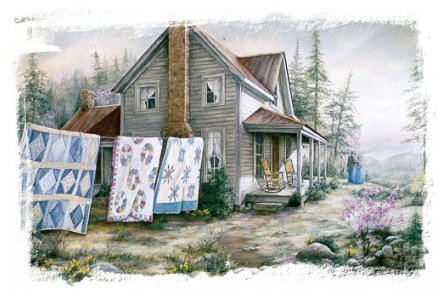
“Country”
“Country”
is a term often used to express a way of living that
has
been around for centuries. Barbara Mandrell and George
Jones
sang about it in I Was Country When Country Wasn’t Cool.
“Country”
was here way before denim came into style in the cities.
We
called them “blue jeans” and “overalls” and they were all the
same
color of blue when they were new. We didn’t buy them all faded
out
like you see them in the stores today. We just wore them until
they
faded out from being washed and worn so much.
We
also managed to wear our own holes in them.
Country
living is a lot different than life in the city. A lady illustrated
this
when she went to a local dry cleaning store after moving to a
small
town. She wasn’t used to the slower pace of the local merchants.
Not
being aware that most stores were closed during the noon hour,
she
showed up at the cleaners one day carrying a suit to be
cleaned
when the owner was just heading out the door:
"Sorry,
ma'am," said the clerk, "We were just leaving for lunch,
but
we could have it ready for you by closing time."
"That's
fine," she said, as she remembered the many times she had
waited
for several days to get something back from the
dry
cleaners in the city.
"If
it’s after five, just knock on the door when you get here," he added,
as
he walked away with the suit.
"Don’t I need a ticket?" she asked.
"Nope," he said and he started toward the door to leave again.
"But wait a minute, how will you know which suit is mine?" She asked.
He
gave her a puzzled look as he said, "Well, you’re gonna tell us, aren't
you?"
People
who live in the country or in a small town can usually
identify
the trucks and cars that pass by their homes. This is because
there
aren’t very many people who have reason
to
be on these roads except for neighbors. There are a few other
vehicles
like the mail truck or a delivery van now and then but
most
everyone knows those drivers on a first name basis also.
If
anyone in the vicinity gets a new vehicle, the whole neighborhood
will
know about it before sundown. The news travels fast and you
will
hear about it down at the gas station or local café. Someone
will
say, “Have you seen ole Bill’s new pick-up truck?
It’s
a humdinger…got everything on it.
Shoot,
he ain’t even found out all it’ll do yet!”
Although
traffic is minimal in the country, in the fall of the year,
the
roads in these rural areas come to life. We all begin to be more
careful
as we drive to town because we can’t be sure what animal or
piece
of farm equipment might be on the other side of a hill or curve.
The
deer begin to move more this time of year but so do tractors
and
combines. The big event is that it’s harvest time.
There’s
that distinctive “nip” in the air as temperatures begin to drop
a
little and farmers begin to ready their equipment and move out to
their
fields. At the same time, they are hoping that the long period
without
rain didn’t hurt the yield of the corn or soybeans too much.
For
many farmers, it will mean the difference in being able to pay off loans,
buy
new equipment, or fix up their old farm implements.
In
the times that we live, it is difficult for the small family farms to keep
going
and many times a second job is taken outside the farm just to
keep
things going financially. As one farmer said when asked what
he
would do if he won the Sweepstakes,
“Well,
I guess I’d just keep on farmin’ ‘til it was all gone.”
Some
country folks try to live in the city but many come back to the
farms
and small towns where they feel they can breathe more freely
and
not have to deal with road rage and rush hour traffic. We like
waving
at each other when we meet on the road and we don’t like
having
to show three forms of ID just to buy a loaf of bread.
“Country”
seems to be in the blood of some
of
us and there’s just no getting away from it. It’s in our hearts
and like
Scarlett
O’Hara in Gone With The Wind; we need to come home to Tara.
What I’ve learned about living in the country:
-If
you forget and leave your coat on the back of a chair at the local restaurant,
it
will still be there when you go back for it the next day.
-If
you call a wrong number, the person answering will supply you with the
correct number
but
you’ll probably have to visit with them a few minutes first.
-Everyone knows what 4-H is and can probably recite the pledge.
-A “Night on the Town” only takes about 10 minutes.
-There's not much of anyplace to go that you shouldn't.
-The New Year’s Baby is sometimes born in February.
-Folks
won’t give you directions by street names or house numbers,
but
you’ll get directions by references such as: Turn left at
cowboy
corner, cross Hillburn Bridge*, then go south
to
the old barn next to where the old oak tree used to be.
-We don’t have a village idiot…we just take turns. (Is today my day?)
By
Pamela
R. Blaine
©
September 19, 2003
* I have been told that Hillburn Bridge was named after a man who was known to make moonshine. A story is told that the “revenuers” came around one day but they didn’t find anything. What they didn’t know was that he kept his moonshine in the commode. Of course, back then that was just a big old chamber pot with a lid.